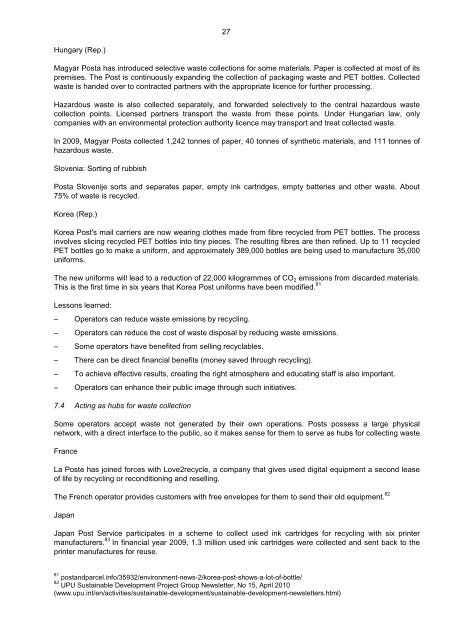ENG - UN CC:Learn
ENG - UN CC:Learn
ENG - UN CC:Learn
You also want an ePaper? Increase the reach of your titles
YUMPU automatically turns print PDFs into web optimized ePapers that Google loves.
27<br />
Hungary (Rep.)<br />
Magyar Posta has introduced selective waste collections for some materials. Paper is collected at most of its<br />
premises. The Post is continuously expanding the collection of packaging waste and PET bottles. Collected<br />
waste is handed over to contracted partners with the appropriate licence for further processing.<br />
Hazardous waste is also collected separately, and forwarded selectively to the central hazardous waste<br />
collection points. Licensed partners transport the waste from these points. Under Hungarian law, only<br />
companies with an environmental protection authority licence may transport and treat collected waste.<br />
In 2009, Magyar Posta collected 1,242 tonnes of paper, 40 tonnes of synthetic materials, and 111 tonnes of<br />
hazardous waste.<br />
Slovenia: Sorting of rubbish<br />
Posta Slovenije sorts and separates paper, empty ink cartridges, empty batteries and other waste. About<br />
75% of waste is recycled.<br />
Korea (Rep.)<br />
Korea Post's mail carriers are now wearing clothes made from fibre recycled from PET bottles. The process<br />
involves slicing recycled PET bottles into tiny pieces. The resulting fibres are then refined. Up to 11 recycled<br />
PET bottles go to make a uniform, and approximately 389,000 bottles are being used to manufacture 35,000<br />
uniforms.<br />
The new uniforms will lead to a reduction of 22,000 kilogrammes of CO 2 emissions from discarded materials.<br />
This is the first time in six years that Korea Post uniforms have been modified. 81<br />
Lessons learned:<br />
– Operators can reduce waste emissions by recycling.<br />
– Operators can reduce the cost of waste disposal by reducing waste emissions.<br />
– Some operators have benefited from selling recyclables.<br />
– There can be direct financial benefits (money saved through recycling).<br />
– To achieve effective results, creating the right atmosphere and educating staff is also important.<br />
– Operators can enhance their public image through such initiatives.<br />
7.4 Acting as hubs for waste collection<br />
Some operators accept waste not generated by their own operations. Posts possess a large physical<br />
network, with a direct interface to the public, so it makes sense for them to serve as hubs for collecting waste.<br />
France<br />
La Poste has joined forces with Love2recycle, a company that gives used digital equipment a second lease<br />
of life by recycling or reconditioning and reselling.<br />
The French operator provides customers with free envelopes for them to send their old equipment. 82<br />
Japan<br />
Japan Post Service participates in a scheme to collect used ink cartridges for recycling with six printer<br />
manufacturers. 83 In financial year 2009, 1.3 million used ink cartridges were collected and sent back to the<br />
printer manufactures for reuse.<br />
81 postandparcel.info/35932/environment-news-2/korea-post-shows-a-lot-of-bottle/<br />
82 UPU Sustainable Development Project Group Newsletter, No 15, April 2010<br />
(www.upu.int/en/activities/sustainable-development/sustainable-development-newsletters.html)

















